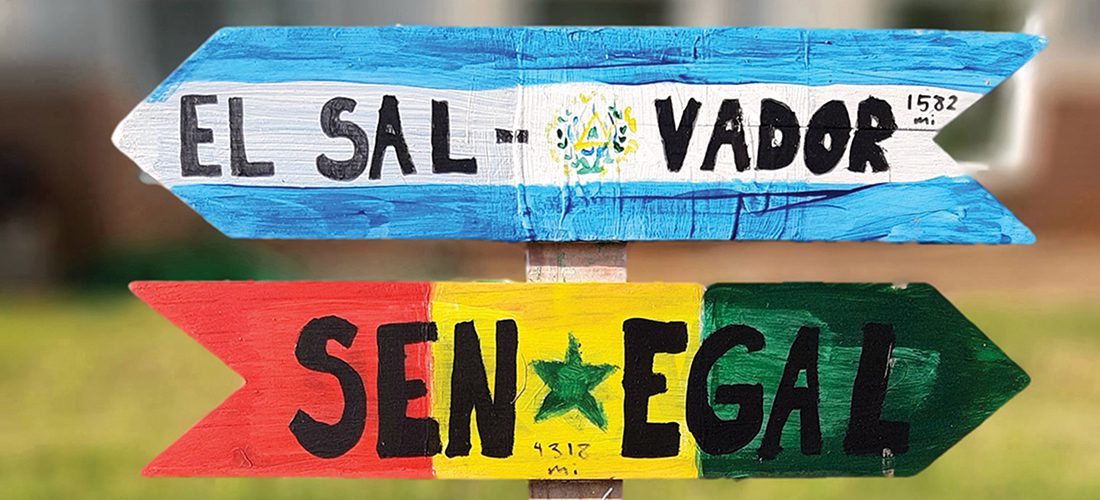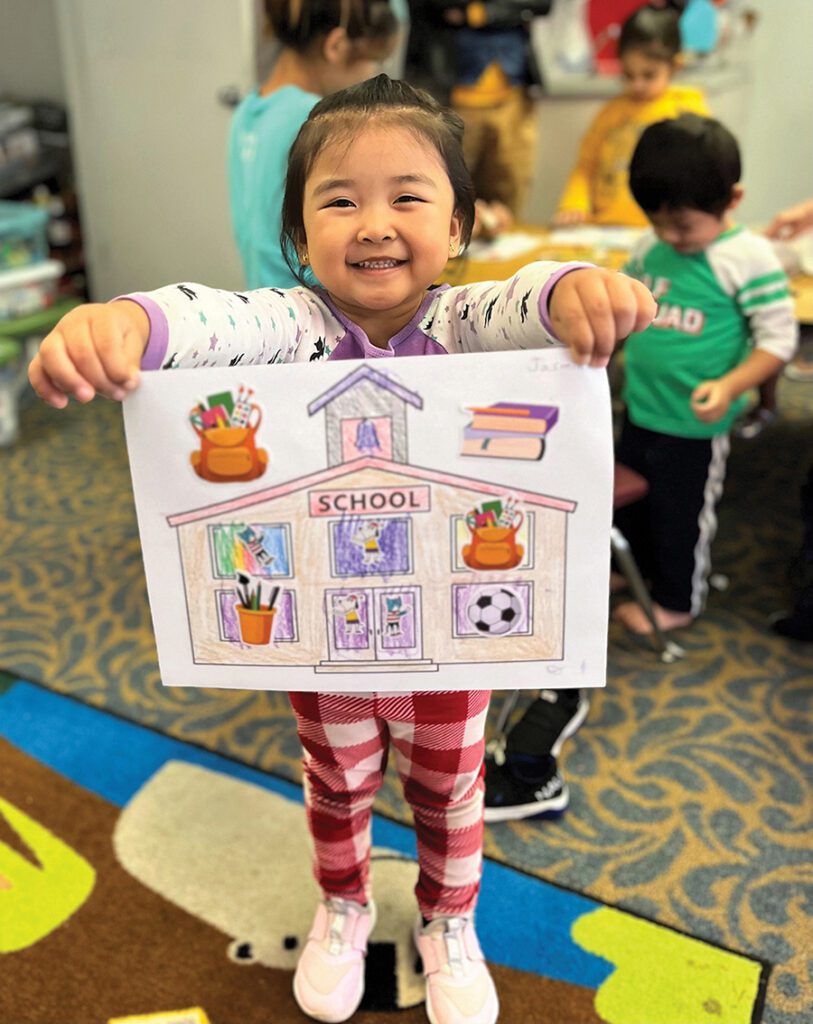Refugees in Charlotte find new beginnings
September 28, 2023

Charlotte’s Refugee Support Services has helped thousands of vulnerable global refugees transition into the community.
by Michael J. Solender
Aime Izilaba didn’t know much about Charlotte when he first arrived here in 2021. Izilaba, 39, landed in the Queen City as a refugee from the Democratic Republic of the Congo. He was riding a tail of violence and insecurity that displaced him and more than 5 million of his countrymen due to more than a decade of political unrest and conflict. He lost his father and other family and friends to the horrors and internal strife afflicting his central African nation.
Alone and afraid, the onetime medical student and researcher found his new life in America filled with challenges at every turn. He immersed himself in English classes and set about looking for work and a pathway to adjust to his newfound community.
“The kind of life I found here was filled with daily challenges and hardship,” Izilaba says. “Every day, I felt traumatized by challenges I found with transportation, housing and simply surviving. I found it all very difficult to navigate. I felt a bit sad.”
A few months into his transition, fate intervened and Izilaba was referred to Charlotte post-resettlement organization, Refugee Support Services (RSS).
Established in 2006, the nonprofit works with refugees, asylees, humanitarian parolees and their families to aid with transition into the community. Since its founding, the organization has served thousands representing more than 33 countries of origin. Last year alone, RSS served more than 800 children and adults with education programs including English and financial literacy, nutrition, and college preparation, along with access to fresh food, community resources and referrals.
A welcoming space
“It’s so important to have a safe and welcoming place when people first arrive,” says Lindsay LaPlante, RSS executive director. “RSS is equipped with resources to help navigate this new, often confusing environment people find themselves in. Everyone is always welcome here; there’s always a place for them.”
LaPlante, 37, says the need for the services RSS provides is growing exponentially and that Charlotte is a leading destination for placement given our community’s infrastructure.
“Refugees are one of the very tiniest portions of immigrants that arrive to the country in any given year,” LaPlante says. “Through Covid, North Carolina became one of the largest resettling states in the country. Internationally speaking, there’s an understanding of what it means to be a refugee. They are fleeing something, going from something dangerous to something safe.”
Achieving refugee status involves an arduous application process, LaPlante says, commencing with resettlement in a temporary host country outside the nation refugees are fleeing and then, only after approval, to their new home country.
“Anybody who is arriving as a refugee comes through a very extensive process that typically takes somewhere between two to five to 10 years, depending on where they’re coming from,” LaPlante says. “This includes background documentation and background checks with the State Department and other federal agencies.”

Once people are assigned to resettlement in the U.S., explains LaPlante, there are fewer than a dozen umbrella organizations at the national level where their cases are assigned. New arrivals are ultimately placed within communities based upon factors such as existing landed populations and support infrastructure.
“Two primary resettlement organizations operate in Charlotte, Carolina Refugee Resettlement Agency, and Charlotte Catholic Charities. Here, the focus is assisting refugees into their new home during their first 90 days.” LaPlante says. “They get established in their apartments, go through all their medical screenings and immunizations, Social Security registration, work permit paperwork, enrolling in school, starting bank accounts. All the things that you need to live your life here must be done within the first 90 days. It’s after that where we get involved.”
For Faisal (he requested his last name be withheld for security reasons), who arrived in Charlotte from Afghanistan in January, connecting with RSS is a true lifeline. Faisal, 26, was working as an interpreter for a U.S. Army subcontractor during the military occupation. He was in Kabul and experienced the chaotic 2021 government collapse after the U.S. troop withdrawal.
He came to the U.S. under a Special Immigrant Visa given his support of the U.S. government abroad. RSS serves those with this status, as well as those classified as humanitarian parolees. The special status is granted to a foreign national who is otherwise inadmissible to temporarily enter the United States due to an emergency, urgent humanitarian reason or significant public benefit.
“Upon arrival, I felt like I had no one to help me,” says Faisal, who has a degree in business management from Kabul University. “After I learned of RSS, I met new friends, people who welcomed me and knew how I felt. I’ve built up my confidence. In the U.S., you must do everything on your own. RSS has helped me feel less alone. They feel like my family here.”
RSS receives federal and state funding as well as private support, including in-kind donations. Its budget this fiscal year is $1.3 million, and the organization employs 15 staff members. LaPlante says nearly half of RSS’s in-kind donations are food. Freshlist, a Charlotte distributor to local restaurants, donates up to 180 fresh food boxes for program participants weekly. Other donors include the Carolinas Gleaning Network (Society of St. Andrew), and several community groups and neighborhood associations.
Building community relationships
LaPlante says a significant focus for RSS is helping new arrivals build relationships in the community. The RSS headquarters in east Charlotte offers a bright, welcoming environment for classes, arts and crafts, and informal community gatherings.
“Community relationships are at the core of our mission,” LaPlante says. “For families with school-age children, for example, we have programs to help them learn about what education looks like in Charlotte, how to connect with teachers and administrators. We have CMPD come out to meet and interact with our program participants. Many new residents come from places where the police are corrupt, or to be feared. We want to show them that the police can be called upon for help.”
Creating a strong multicultural community and developing fellowship are natural byproducts of work that happens at RSS. Many of the most meaningful connections develop between program participants themselves, sharing their own tips and advice for each other.
“We all come from beautiful cultures,” says Yuliia (Julie) Mikhachova, 31, who recently arrived with her family from Ukraine. “But we are now in a new country, with a new language, new customs and culture to learn — it’s wonderful to have each other for support.” Mikhachova worked as a teacher and vice principal in Ukraine. She’s taken on a part-time role at RSS as the Ukrainian outreach coordinator and helps with English language instruction.
For Izilaba, his new family at RSS has meant the world. He now works part time at RSS in supporting recent arrivals. “RSS is like my family here in the U.S,” Izilaba says. “In Congo after losing my father I thought, I will never find a family that is mine again. Yet today, I can say I have another family. I hope to be back in school very soon. I know I will achieve my goals. I feel I have a future.” SP
Photographs courtesy RSS and Michael J. Solender

